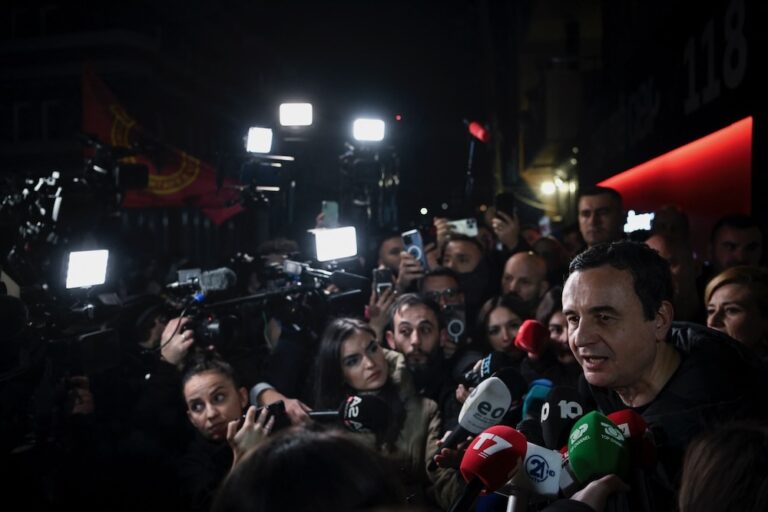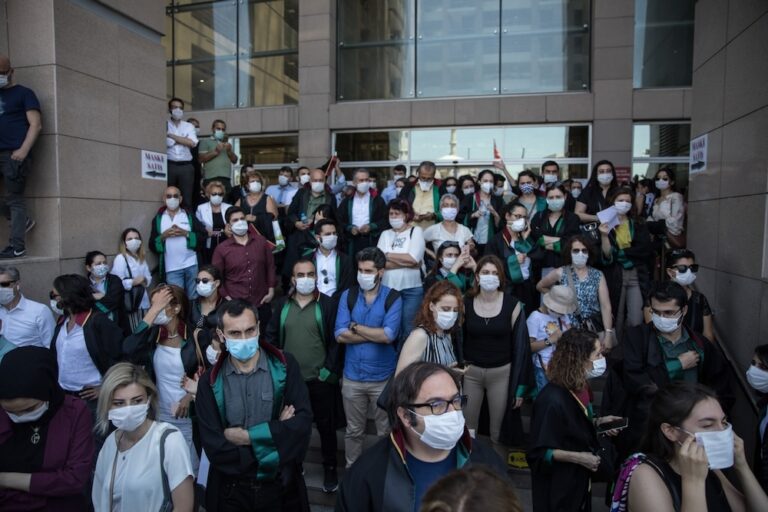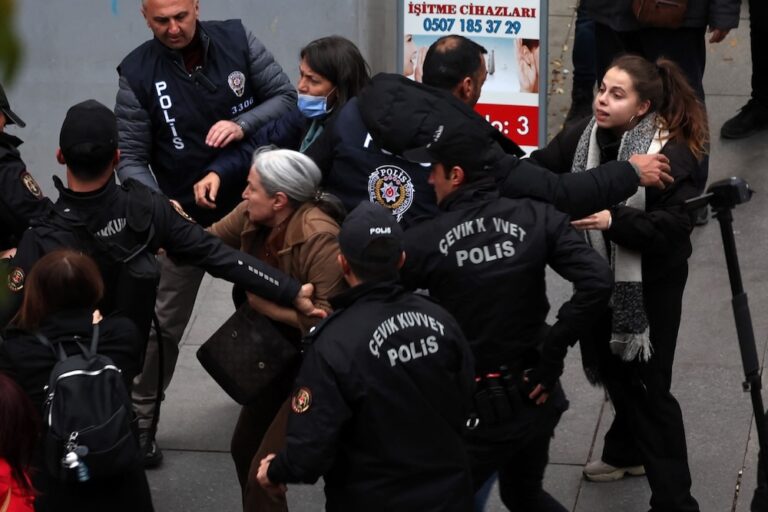At the fourth hearing of Osman Kavala's trial, his lawyer pointed to the recent ECtHR ruling that his client should be released immediately. However, the 30th High Criminal Court of Istanbul ruled to continue Kavala's detention.
This statement was originally published on expressioninterrupted.com on 24 December 2019.
Court hears two witnesses of the prosecution at Gezi Park trial’s fourth hearing; trial adjourned until 28 January
The fourth hearing in the Gezi Park trial, where jailed businessperson Osman Kavala and 15 other civil society members face aggravated life imprisonment on the charge of “attempting to overthrow the government,” took place on 24 December 2019 at the 30th High Criminal Court of Istanbul.
P24 monitored the hearing, held at a courtroom near the Silivri Prison compound in Istanbul. Co-Chair of the Delegation to the EU-Turkey Joint Parliamentary Committee of the European Parliament Sergey Lagodinsky, Dutch, Swedish and Italian Consuls General in Istanbul and representatives from Amnesty International and Human Rights Watch (HRW) were also among the observers monitoring the hearing.
The hearing followed on the heels of the European Court of Human Rights’ (ECtHR) 10 December 2019 judgment concerning the individual application of Osman Kavala, which held that his pre-trial detention was in violation of his right to liberty and security and his right to a speedy decision on the lawfulness of his detention, and that Turkey should secure his immediate release. Kavala has been in pre-trial detention as part of the case since November 2017.
In addition to Kavala, his co-defendants Mücella Yapıcı, Ali Hakan Altınay, Mine Özerden, Çiğdem Mater, Can Atalay, Tayfun Kahraman, Yiğit Aksakoğlu and Yiğit Ali Ekmekci were present in the courtroom for the fourth hearing.
Three witnesses of the prosecution were expected to testify during the hearing, which was planned to continue for two days. Instead the court heard two of the witnesses – law enforcement officials Ercan Orhan Aydın and Hasan Gül, both of whom were police supervisors with the Istanbul Police Department at the time of the Gezi Park protests. The third witness, a retired military officer, did not attend the public hearing and will instead be heard on 25 December during a session where the defendants and defense lawyers will not be present.
Aydın told the court that he saw Kavala for the first time in the courtroom during the trial and that he had no knowledge as to who orchestrated or financed the Gezi Park protests. He said he did not see any of the defendants in action during the protests.
Gül also told the court that the division he supervised was tasked with accompanying riot police in suppressing violence and that he too had no information as to whether any of the defendants had played a part in allegedly orchestrating the protests. Gül added that he never saw Kavala take part in any of the demonstrations that allegedly involved violence. In response to a question from the presiding judge, Gül confirmed that he made numerous negotiations with the defendant Can Atalay during the protests because Atalay is a lawyer, adding that negotiations with Atalay proved particularly helpful in ensuring that Berkin Elvan’s funeral transpired without any trouble. Gül added that he did not witness any systematic action during the protests but that he saw a lot of people go to the park to bring protesters food items.
After the completion of witness statements, Kavala addressed the court in relation to his pre-trial detention. Reiterating that he was being held on baseless allegations, Kavala said the evidence against him in the indictment did not involve any criminal elements and asked to be released pending trial.
Kavala’s lawyers then addressed the court concerning the ECtHR’s judgment, noting that Strasbourg did not only find rights violations in Kavala’s application but also held that Turkey should immediately release him.
Adding that testimony by two witnesses the court heard earlier proved that Kavala’s actions did not involve violence, force or criminal intent, the lawyers asked the court to release their client. The lawyers noted that for the court to inquire of the Justice Ministry about whether the ECtHR ruling is final would serve to further extend Kavala’s detention, which they said would strengthen the belief that the case is politically motivated.
Afterwards, an attorney submitted to the court the Treasury’s request to be given intervening party status in the case, to which defense lawyers objected, saying there has to be a relation of causality for the Treasury to be an intervenor in the trial.
The prosecution requested the continuation of Kavala’s detention on remand based on the classification of the alleged crime.
Issuing its interim decision following a brief deliberation, the court granted intervenor status to a group of police officers and the Treasury. Ruling for the continuation of Kavala’s detention on remand citing the classification of the alleged offense and ruling that detention is a proportionate measure, the court adjourned the trial until 28 January 2020, awaiting the Justice Ministry’s response concerning the ECtHR judgment in Kavala’s application.



